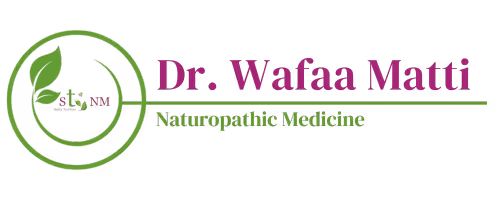
Fall is a season of beautiful transitions—cooler air, cozy sweaters, and colorful trees. But it’s also when many people begin to feel run down, get the first sniffles of the season, or catch a cold that lingers. With shorter days, less sunlight, and more time spent indoors, our immune systems often need a little extra support to stay strong.
Rather than bracing for illness, what if you could naturally strengthen your body’s defenses? That’s where naturopathic immune support comes in. By using time-tested herbs, key nutrients, and daily lifestyle practices, you can boost immunity naturally and stay vibrant through the season.
As a naturopathic doctor, I help patients activate their body’s innate ability to protect and heal using science-backed herbal support, key nutrients, and immune-friendly lifestyle shifts. Whether you're looking to prevent seasonal sniffles or support a resilient immune system year-round, fall is the perfect time to be proactive.
No harsh meds, no guessing—just real, holistic ways to prevent burnout and promote vitality. Whether you're looking to prevent colds, reduce stress-related illness, or simply stay energized, these naturopath immune tips are your autumn toolkit.
Why Immunity Weakens in the Fall
Less Sunlight = Lower Vitamin D
Sunshine is our most natural source of vitamin D, a critical nutrient for immune function. As daylight hours shrink, most people get far less sun exposure, especially on their skin. Low vitamin D levels have been linked to increased susceptibility to respiratory infections, fatigue, and even mood imbalances.
Dry Indoor Air Irritates the Respiratory Tract
When we heat our homes in the fall, the air becomes dry—dry enough to dry out your nasal passages and throat, which are part of your first line of immune defense. This makes it easier for viruses to enter and harder for your body to trap and eliminate them.
Holiday Stress & Sugar Weaken Immunity
Let’s face it—fall kicks off the season of sugar, stress, and packed schedules. Elevated cortisol from stress and high sugar intake can both suppress immune function, leaving your body more vulnerable to infection and slower to recover.
More Time Indoors = Higher Germ Exposure
Cooler temps mean more people crowding into enclosed spaces. This increased close contact indoors boosts the spread of viruses, especially in schools, offices, and gatherings.
Key Nutrients to Support Immunity
Vitamin D
Vitamin D plays a crucial role in immune cell signaling and helps reduce the risk of respiratory infections. It supports the production of antimicrobial peptides and enhances your body’s ability to fight off viruses and inflammation.
- Why it matters in fall: With less sun exposure, vitamin D levels can drop significantly.
- Tip: Ask your healthcare provider about testing your vitamin D levels. Many people benefit from supplementation during darker months.
- Food sources: Fatty fish (salmon, sardines), egg yolks, fortified dairy or plant milks.
Vitamin C and Zinc
This powerhouse pair is well-known for its ability to prevent and shorten the duration of colds.
- Vitamin C is an antioxidant that supports white blood cell function and protects cells from oxidative stress.
- Zinc is involved in immune cell development and repair—and a deficiency can make you more susceptible to infections.
- Food sources:
- Vitamin C: bell peppers, kiwi, citrus, strawberries
- Zinc: pumpkin seeds, lentils, chickpeas, beef
- Dosing tip: For daily immune support, aim for 500–1000mg of vitamin C and 15–30mg of zinc (always consult a provider before high-dose use).
Omega-3s and Antioxidants
Omega-3 fatty acids are natural inflammation modulators, helping your immune system stay calm but responsive. Paired with antioxidant-rich foods, they provide powerful cellular protection.
- Food sources:
- Omega-3s: flaxseeds, chia seeds, walnuts, wild-caught fish
- Antioxidants: dark leafy greens, berries, pomegranate, green tea
These nutrients don’t just prevent colds—they help you recover faster and reduce your risk of chronic inflammation that can compromise immunity.
Herbal Immune Allies
Elderberry
Elderberry (Sambucus nigra) is rich in antioxidants and flavonoids that support the immune response and may reduce the duration and severity of viral infections.
- Best used for: Prevention during cold/flu season or at the first sign of symptoms
- How to take it: Syrup, lozenges, or tea—daily during high-risk periods
- Bonus: Elderberry also helps calm inflammation and supports respiratory health
Echinacea
Echinacea is an immune-stimulating herb known for its ability to enhance white blood cell activity and ward off infections. It’s most effective when taken at the onset of illness—not as a long-term preventive.
- Best used for: Short-term immune activation during exposure or first symptoms
- Who should be cautious: Those with autoimmune conditions should consult a provider, as Echinacea may overstimulate the immune system
Astragalus & Reishi
Both Astragalus root and Reishi mushroom are adaptogens—herbs that help your body manage stress while also supporting immune resilience.
- Astragalus: Strengthens immunity over time, great for people prone to getting sick frequently
- Reishi: Known as the “mushroom of immortality,” it helps modulate immune activity and calm the nervous system
- How to use: As teas, tinctures, or in functional mushroom blends. These are safe for daily use and ideal for fall immune and stress support.
Daily Lifestyle Habits That Strengthen Immunity
Prioritize Restorative Sleep
Sleep isn’t just rest—it’s immune repair time. While you sleep, your body produces natural killer cells and cytokines that identify and destroy pathogens.
- Aim for: 7–9 hours of sleep per night
- Ideal bedtime: Between 9:30–10:30 PM to align with your natural melatonin rhythm
- Tips: Wind down with herbal teas (like chamomile or valerian), reduce screen time, and keep a consistent bedtime—even on weekends
Move Daily, But Don’t Overtrain
Gentle, consistent movement boosts your lymphatic flow and circulation, helping immune cells travel efficiently throughout the body. But too much intense training can temporarily suppress immunity.
- Best fall movement: Brisk walks, yoga, tai chi, or stretching
- Warning signs of overtraining: fatigue, frequent illness, irritability, poor sleep
Listen to your body—movement should energize, not exhaust.
Stay Hydrated and Eat Immune-Friendly Foods
What you eat can either fuel your immune system—or deplete it.
Fall immune-boosting favorites:
- Warm broths: Nourish your gut lining and provide easy-to-digest nutrients
- Garlic & ginger: Natural antimicrobials with anti-inflammatory effects
- Cruciferous veggies: Broccoli, kale, cauliflower support liver detox and immune modulation
Avoid common immune saboteurs:
- Sugar: Just one sugary drink can suppress immune response for hours
- Alcohol: Disrupts sleep, impairs gut flora, and dehydrates
- Ultra-processed foods: Promote inflammation and weaken gut health
Hydration tip: Sip herbal teas (like nettle or echinacea) throughout the day for bonus immune benefits.
Immune Support for the Stressed Body
Simple Tools to Activate Your Parasympathetic Nervous System
To support immunity, you need to activate your "rest and digest" mode—the parasympathetic nervous system. This is where healing and immune repair occur.
Try these daily practices:
- Breathwork: Slow, deep breathing (like box breathing or 4-7-8 breathing) calms the nervous system in just minutes
- Meditation or prayer: Lowers stress hormones and improves emotional resilience
- Vagus nerve activation: Humming, gargling, cold water face splashes—simple tricks that stimulate your body’s built-in calming system
Adaptogenic Herbs
Adaptogens are herbs that help your body adapt to physical, mental, and emotional stress—without overstimulating. Two standouts for immune + stress synergy:
- Holy Basil (Tulsi): Calms the mind, supports the adrenals, and has mild antiviral properties
- Ashwagandha: Nourishes the nervous system, stabilizes cortisol, and enhances resilience
These herbs are gentle enough for most people and can be taken as teas, capsules, or tinctures. Always consult a provider for personalized recommendations.
Reclaim Your Fall Wellness—Naturally
Fall doesn’t have to mean falling ill. While seasonal shifts can challenge your immune system, they also offer an opportunity to slow down, nourish deeply, and reconnect with natural rhythms.
By incorporating immune-boosting herbs, nutrient-rich foods, restorative sleep, and stress-balancing rituals, you give your body the tools it needs to stay resilient and well.
Small, natural habits—practiced consistently—can have a big impact. And when you listen to your body, it responds with strength and clarity.
Ready to Strengthen Your Immune System This Fall?
📍 Visit by appointment:
Stengler Center for Integrative Medicine
324 Encinitas Blvd, Encinitas, CA 92024
📞 Call: 760-274-2377
📧 Email: clinic@drwafaamatti.com
🌐 Website: drwafaamatti.com
🔗 Stay connected for more immune & wellness tips:
Instagram | Facebook | YouTube | X | LinkedIn
.svg)
Explore Our Latest Insights
Discover tips for better digestive health.
Ready to Take the Next Step?
Reach out today to schedule your visit or ask a question—Dr. Wafaa’s team is here to support your wellness journey, both in person and online.


